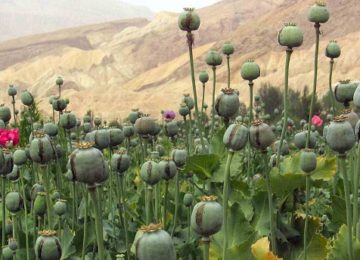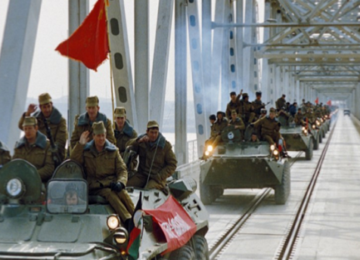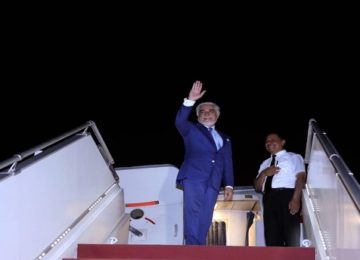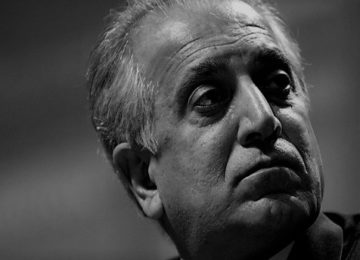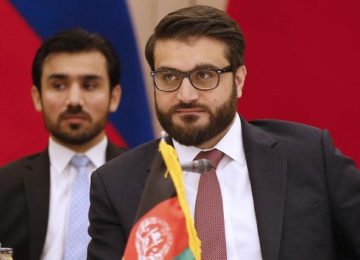International Criminal Court (ICC) Prosecutor Fatou Bensouda has requested judicial authorisation to open an investigation into crimes allegedly committed in connection to the Afghan armed conflict. If the judges of the court’s Pre-Trial Chamber agree, there could now be investigations of the Taleban for many types of war crimes and crimes against humanity, and Afghan and United States forces, both for the war crime of torture. Bensouda said the requested investigation would also look into “crimes closely linked to the situation in Afghanistan allegedly committed… on the territory of other States Parties to the Rome Statute,” a reference to the CIA’s use of black sites for torture and interrogation in Poland, Lithuania and Romania. Bensouda’s move has come despite concerted lobbying by Kabul to drop or delay the investigation. Ehsan Qaane and Kate Clark have been looking into what the announcement means and what happens next.
Almost a year since the ICC’s Office of the Prosecutor (OTP) announced, on 14 November 2016, that a decision would be made “imminently” on whether it would request an investigation into crimes allegedly committed on Afghan soil, ICC Prosecutor Bensouda announced her decision:
For decades, the people of Afghanistan have endured the scourge of armed conflict. Following a meticulous preliminary examination of the situation, I have come to the conclusion that all legal criteria required under the Rome Statute to commence an investigation have been met. In due course, I will file my request for judicial authorisation to open an investigation, submitting that there is a reasonable basis to believe that war crimes and crimes against humanity have been committed in connection with the armed conflict in Afghanistan. (1)
What has the ICC done so far?
Afghanistan is a state party to the ICC. This means that the court can prosecute individuals of any nationality who are alleged to have committed war crimes, crimes against humanity or genocide on Afghan soil. The crimes need to meet ICC’s gravity threshold and the Afghan government needs to be unwilling or unable to prosecute the crimes nationally. The preliminary examination into crimes committed in Afghanistan was initiated in 2007 by the ICC Prosecutor. It was not requested by Afghanistan or the United Nations Security Council which means under the court’s rules that, once the Prosecutor has determines that there is a case or cases to answer, there has to be an additional, preliminary judgement by a panel of judges from the Pre-Trial Chamber. The judges will review the Prosecutor’s request, as well as all the supporting evidence, to ensure that an investigation is merited.
Bensouda has yet to file her request, but the ‘Afghanistan situation’ has been under what is called ‘preliminary examination’ for ten years and the likely direction of the OTP’s case can be seen from earlier reports, particularly the last, the November 2016 Preliminary Examination Report. (For AAN’s analysis of that report, see here, earlier preliminary examination reports here and background information on the ICC and Afghanistan’s situation see AAN’s previous dispatches here and here.) Human Rights Watch has said the move to request an investigation is long overdue.
More than 10 years ago, the court began its preliminary analysis in Afghanistan – the phase to determine whether there are possible ICC crimes and if the court should act. In the meantime, there have been countless summary executions, forced disappearances, acts of torture, and suicide attacks on civilians in the country. These abuses have largely gone unchecked.
What might the ICC investigation cover?
The ICC was established in 2002 and Afghanistan ratified the Rome Statute on 1 May 2003, so the vast majority of war crimes and crimes against humanity committed during almost four decades of war in Afghanistan – by the PDPA, mujahedin, Taleban government and Soviet forces – do not fall under ICC jurisdiction. Instead, three parties have been named in the Preliminary Examination: the Taleban, various Afghan government forces and the US military and CIA. If an investigation does go ahead and charges are made, these would be against individuals, not against states or armed groups.
The party to the conflict facing the most serious and multifarious allegations are the Taleban. In the OTP’s November 2016 Preliminary Examination Report, it said there was a reasonable basis to believe that the Taleban and Haqqani network have committed war crimes (murder; intentionally directing attacks against the civilian population, humanitarian personnel and protected objects; conscripting children; and killing or wounding treacherously a combatant adversary – all of which, it said, “were committed on a large scale and as part of a plan or policy”) and crimes against humanity (murder; imprisonment or other severe deprivation of physical liberty and persecution against any identifiable group or collectivity on political grounds and on gender grounds, all “allegedly committed as part of a widespread and/or systematic attack…” (For the full quote, see paragraphs 206 and 207 of the report.)
The Afghan government also faces an investigation for the war crimes of torture and cruel treatment; outrages upon personal dignity pursuant to article; and sexual violence. In the 2016 Preliminary Examination Report, the OTP named the Afghan intelligence agency, the National Directorate of Security (NDS), the Afghan National Police, Afghan National Army, Afghan National Border Police and the Afghan Local Police as alleged perpetrators and said it estimated that 35 to 50 per cent of all conflict-related detainees “may be subjected to torture,” carried out in a “state of total impunity.”
However, the most attention, if an investigation does go ahead, would be on allegations against the US, specifically that members of its intelligence agency, the CIA, and its military, during interrogations of security detainees and in conduct supporting those interrogations, as the 2016 Preliminary Examination Report put it:
… resorted to techniques amounting to the commission of the war crimes of torture, cruel treatment, outrages upon personal dignity, and rape… Specifically:
Members of US armed forces appear to have subjected at least 61 detained persons to torture, cruel treatment, outrages upon personal dignity on the territory of Afghanistan between 1 May 2003 and 31 December 2014. The majority of the abuses are alleged to have occurred in 2003-2004.
Members of the CIA appear to have subjected at least 27 detained persons to torture, cruel treatment, outrages upon personal dignity and/or rape on the territory of Afghanistan and other States Parties to the Statute (namely Poland, Romania and Lithuania) between December 2002 and March 2008. The majority of the abuses are alleged to have occurred in 2003-2004.
Crucially, the OTP said these “alleged crimes were not the abuses of a few isolated individuals,” but rather were part of a policy:
The Office considers that there is a reasonable basis to believe these alleged crimes were committed in furtherance of a policy or policies aimed at eliciting information through the use of interrogation techniques involving cruel or violent methods which would support US objectives in the conflict in Afghanistan.
The OTP has decided that thresholds of admissibility have been reached, ie the alleged crimes are under ICC jurisdiction, are sufficiently grave and are not being addressed by domestic or other legal bodies.
What is the Afghan government’s position?
It was only after the dissemination of the 2016 preliminary examination report that the Afghan government finally and belatedly began to communicate directly with the ICC. The government’s main aim was to convince the ICC that it was willing and able to prosecute war crimes nationally. The Afghan government sent two delegations to The Hague discuss cooperation (one in December 2016 and one in January 2017) and also informed the court of examples of national prosecutions and new laws. For example, it sent 15 cases including the cases of Anas Haqqani and Hafiz ul-Rashid, two senior members of the Haqqani network who are in Afghan government custody (for more details, see AAN’s previous dispatch).
The government also took several anti-torture measures. Torture was already illegal in multiple ways, including under the Afghan constitution, but nonetheless, in March 2017, the government also adopted some new measures. A new Torture Law and added the crimes listed in the Rome Statute, word for word, into its newly approved Penal Code. The Penal Code was approved by presidential decree on 4 March 2017 and is due to come into force on 14 February 2018. It makes the perpetrators of war crimes, crimes against humanity and genocide punishable by prison terms of up to 30 years, execution and/or compensating victims. More details of these new measures can be read about in AAN’s analysis of Afghanistan’s submission to the expert committee monitoring compliance with the UN Torture Convention, which met in April 2017.
However, the government’s new measures have had, as yet, no impact on what actually happens to conflict-related detainees. This was made clear in UNAMA’s most recent report on the subject, also published in April 2017 (read AAN analysis here which found the prevalence of torture had increased since its previous report in 2015 (39 per cent of detainees interviewed had been tortured, compared to 31 per cent) and a “pervasive culture of impunity” with torturers facing little risk even of disciplinary action, let alone being prosecuted.
Moreover, it is difficult for the Afghan government to claim it is ready and able to prosecute (not just government torturers, but alleged Taleban war criminals), as long as the Amnesty Law is in force. The law gives an amnesty to anyone who perpetrated war crimes before 2001 and any perpetrator since who reconciles with the government. The Amnesty Law was used in the OTP’s preliminary examination reports as evidence that Kabul is not willing or able to prosecute.
Afghanistan could have prosecuted perpetrators of war crimes and crimes against humanity during the period of the preliminary examination, making an ICC intervention unnecessary. The Afghanistan situation was under OTP scrutiny for ten years, making it the second longest preliminary examination after Colombia’s, which began in 2004. If the Afghan government had taken the ICC seriously and prosecuted some of the major perpetrators of the crimes under the court’s jurisdiction, Kabul might at least have won itself the same chance Colombia has. Bogota proved to the ICC that it was investigating and prosecuting the perpetrators in national courts and a full investigation was postponed.
Since November 2016, efforts have been made to get the investigation dropped or delayed. Nader Nadery, Afghanistan’s focal point for the ICC, told AAN in October 2017 that a meeting between President Ashraf Ghani and Prosecutor Fatou Bensouda on 22 September 2017 on the sidelines of the United Nations General Assembly in New York had gone well. In the meeting, Ghani reportedly told Bensouda that “morally he is on the side of the ICC [to provide justice for war victims], but legally he is not.” He added that Bensouda’s arguments about the “admissibility of cases” were not convincing. AAN was also told by a government source that Kabul tried to argue that the court’s intervention would harm the Afghan ‘peace process’ (what that might be was not clear) and would have a negative, although unspecified impact on the presence of international troops in its county. The result, the source said, would be instability and greater violence in the country. In other words, Kabul tried to argue that an ICC intervention would not be in in the ‘interest of justice’, ie the interests of the victims (a reason for an investigation not to go ahead, according to the Rome Statute).
The government’s attempts since November 2016 to present itself as both willing and able to prosecute will have had to have been considered by the OTP before it could take any further step, according to the provision of the Rules of Procedures and Evidence of the ICC. This might have been why the OTP spent a year considering whether to request authorisation from the Pre-Trial Chamber for an investigation. Nevertheless, those efforts have failed.
There has not been any official comment from the Afghan government as yet. However, the Afghanistan Independent Human Rights Commission (AIHRC) has welcomed the OTP’s decision, saying on 4 November 2017 that it “believes that supporting and providing justice by using any domestic and international mechanism is crucial to end impunity, prosecute perpetrators and bring justice for victims.” It called on the government to fulfil its obligations according to the Rome Statute and fully assist the ICC. An Afghan pressure group, the Transitional Justice Coordination Group (TJCG), a network of 26 individuals and civil society organisations, called on the Pre-Trial Chamber to authorise the investigation and urged the government to help ICC investigators and protect victims and witnesses. It said justice could help build a sustainable peace in the country (press statement released on 5 November 2017 which AAN has a soft copy of).
What is the US position?
Former President Bill Clinton signed the Rome Statute in 2000, but did not submit it for Senate ratification. His successor, George Bush, American president when the ICC was founded in 2002, said the US would not join it. He also established what opponents have called the ‘Hague Invasion Act’, the 2002 American Service Members Protection Act which prohibits cooperation with the ICC and allows the president to authorise military force to free any American military personnel held by it. President Obama re-established a working relationship with the ICC, with the US as an observer. However, the Rome Statue remains unratified by Washington.
Even so, because Afghanistan is a member of the ICC, the ICC has jurisdiction over American personnel in Afghanistan. This is despite the 2014 US-Afghan Status of Forces Agreement (SOFA) (see analysis here which stipulates that members of US forces “may not be surrendered to, or otherwise transferred to, the custody of an international tribunal or any other entity or state without the express consent of the United States.” Rather the US has the “exclusive right to exercise jurisdiction” over them. Under the Rome Statute, there is a provision for an agreement like the SOFA to excuse the Afghan government from arresting US citizens or surrendering them to the court. However, they do not protect US nationals who may have committed war crimes or crimes against humanity on Afghan soil from being investigated, charged and put on trial. (2)
The US cannot argue that it is able and willing to prosecute the war crime of torture, nationally. The use of torture by US personnel was authorised by the Bush administration in 2002 and although President Obama banned its use when he took office in 2009, his administration decided not to prosecute anyone. “We tortured some folks,” said Obama. “You know, it is important for us not to feel too sanctimonious in retrospect about the tough job that those folks had. And a lot of those folks were working hard under enormous pressure and are real patriots.” President Trump has praised the use of torture saying he liked waterboarding “…a lot. I don’t think it’s tough enough.” Even if it did not work, he said, he would authorise it because “they deserve it anyway for what they do to us.”
At the individual level, the US record on prosecuting those accused of war crimes and crimes against humanity has been poor, as AAN commented in a major report on transitional justice and reconciliation in Afghanistan:
The US military seldom publicizes the results of investigations into specific abuses, including torture, deaths in detention and indiscriminate or disproportionate use of force during ground operations. In the majority of cases, there is little indication that anyone has been held accountable for these abuses.
As the OTP pointed out, the scope of the Department of Justice’s preliminary review (August 2009 to June 2011) of allegations of CIA abuse of detainees, “appears to have been limited to investigating whether any unauthorised interrogation techniques were used by CIA interrogators, and if so, whether such conduct could constitute violations of any applicable criminal statutes.” (emphasis added) In other words, there has been no criminal investigation into the use of authorised torture techniques, a point highlighted by the OTP which quoted the US Attorney General:
“…the Department of Justice (DOJ) will not prosecute anyone who acted in good faith and within the scope of the legal guidance given by the Office of Legal Counsel regarding the interrogation of detainees.”
So far, there has been no official comment from Washington on Bensouda’s announcement of her request to seek authorisation to investigate. (For more detail about the poor record of the US military and CIA on dealing with crimes committed by its members, see these two AAN dispatches here and here.
Looking ahead
The Rome Statue does give some ways for either the US or Afghan government to stop an ICC investigation: prosecutions in national courts (Afghan and/or American); showing that the intervention of the ICC would not be in the interest of justice (Kabul has already argued and failed to convince the OTP on this); or an order from the United Nations Security Council to halt the investigation. Nevertheless, Alex Whiting, former prosecutor at the International Criminal Tribunal for the former Yugoslavia and ICC, writing on the Just Security website thinks the investigation “undoubtedly will” get authorised by the Pre-Trial Chamber and go ahead. He warns, however, that it will be “difficult, if not nearly impossible” to enact:
The ICC has extremely limited investigative powers and is almost entirely dependent on cooperation by states to gather information. In this case, there will be no cooperation from the Afghan government, the Taliban, or the U.S. As a non-State Party, the U.S. is not obligated to cooperate with the ICC, and the American Service-members’ Protection Act largely prohibits the U.S. from voluntarily cooperating. While some alleged victims will be available to be interviewed in other locations, and some evidence of the alleged crimes in Afghanistan and the black sites has been developed and made available by other inquiries, there is no question that it will be extremely difficult for the ICC to develop evidence to prove culpability beyond a reasonable doubt.
Whiting is wrong in saying there will be no cooperation from the Afghan government. It is obliged by the Rome Statute, like all other State Parties, to “cooperate fully with the Court in its investigation and prosecution of crimes within the jurisdiction of the Court” (article 86, Rome Statue). However, he did leave out one very major problem – the ongoing war and the danger that creates for investigators working on the ground and for victims and witnesses.
Afghans and others have suffered terribly from war crimes and crimes against humanity and deserve justice. After the failures of national courts to take their suffering seriously, the launch of an ICC investigation would be immensely significant, putting the most senior, responsible leaders of the Taleban, Afghan security officials and US forces and officials under scrutiny. It would show that even the most powerful people in a country and the most powerful country in the world are not above the law. Yet, any ICC investigation will be difficult and lengthy. If an investigation is authorised, it will be the start of a new chapter for victims to find justice, not the end.
Edited by Sari Kouvo
(1) According to articles 15 and 53 of the Rome Statute, these legal criteria are: 1) at least one of the crimes, which comes under the subject-matter of the ICC, has been committed in the state territory and met the threshold of the ICC in relation to the gravity, 2) the alleged crime has not been proceeded nationally by the state, and 3) there has not be information to believe that the intervention of the ICC will jeopardise “the interests of justice.”
(2) According to article 98 (2) of the Rome Statute, “The Court [ICC] may not proceed with a request for surrender which would require the requested State to act inconsistently with its obligations under international agreements pursuant to which the consent of a sending State is required to surrender a person of that State to the Court, unless the Court can first obtain the cooperation of the sending State for the giving consent for the surrender.”
By Special Arrangement with AAN. Original link.
Disclaimer: Views expressed on this blog are not necessarily endorsed or supported by the Center for Research and Security Studies, Islamabad.




